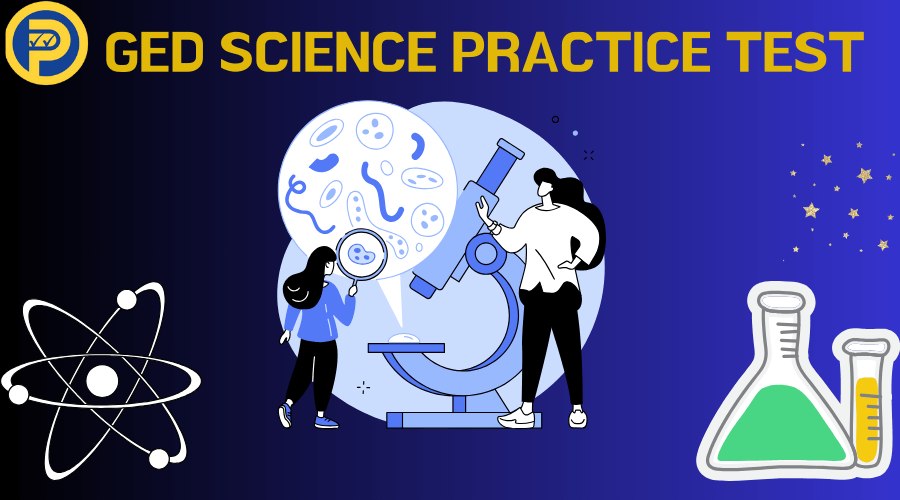Do you wish to score highly in the GED science test? Prepsaret GED Science Practice Test provide questions with answers and explanations to help you identify your strengths and weaknesses, so you can focus on the areas that need the most improvement.
To help you identify areas that require improvement, Prepsaret offers 10 comprehensive science practice tests, comprising 300 questions. This allows you to focus on specific topics that need refinement, saving you time by avoiding repetition of already mastered topics and concepts.
Importance of GED Science Practice Test
- Understanding Test Format and Question Types: The GED Science test includes multiple-choice, drag-and-drop, and other question formats. Practice tests help you familiarize yourself with these different question types and formats.
- Improving Data Interpretation Skills: Many GED Science questions require interpreting data from charts, graphs, and tables. Practice tests allow you to develop the skills needed to read and analyze scientific data.
- Practicing Science Reasoning and Problem-Solving: The GED Science test assesses your ability to draw conclusions, evaluate hypotheses, and apply scientific concepts. Practice tests give you opportunities to strengthen these critical thinking skills.
- Identifying Knowledge Gaps: Detailed feedback from practice tests can help you pinpoint areas where you need to focus your study efforts, allowing you to address weaknesses before the actual exam.
- Building Confidence and Familiarity: Regularly taking practice tests helps boost your confidence and comfort level with the GED Science test format and content. This can reduce test-day anxiety and improve your performance.
- Timing and Pacing Practice: The GED Science test is timed, so practice tests allow you to work on managing your time effectively and completing all questions within the allotted time.
By using GED science practice tests, you can develop the necessary skills, knowledge, and confidence to succeed on the actual GED Science exam.
Type of questions covered in the GED Science Practice Test
Life Science Questions
Life science deals with cell structures and processes, human body systems, health and nutrition, heredity and reproduction, genetics and DNA, evolution and natural selection, and the organization of ecosystems.
GED science practice test questions will require you to comprehend scientific presentations, use the scientific method, reason with scientific information, apply concepts and formulas, and use probabilities and statistics in a science context.
You will need to demonstrate an understanding of these life science concepts and be able to interpret and apply the information presented in passages, graphics, and other scientific materials.
Physical Sciences Questions
The physical science portion focuses on the application of scientific reasoning skills, including comprehending scientific presentations, designing investigations, reasoning from data, evaluating conclusions, and applying concepts of probability and statistics.
The GED science practice test evaluates physical science areas such as thermodynamics, the properties of matter and energy, forces and motion, and the nature of waves and light.
Students are usually asked to read, analyze, and extract information from a variety of scientific materials, including readings, diagrams, graphs, and tables.
Register at Prepsaret to get access to physical sciences practice questions and improve your chances of passing the GED Science test
Earth and Space Science Questions
The Earth and space science topics on the GED Science practice tests focus on assessing students’ understanding of the structure and systems of the Earth, the solar system, and the universe. This may include questions on:
- The Earth’s structure, including the crust, mantle, and core.
- Plate tectonics, geological cycles, and processes.
- The water cycle, nitrogen cycle, and carbon cycle.
- Renewable and non-renewable resources.
- Natural hazards and their effects on living things.
- The planets in our solar system.
- Concepts like black holes, dark matter, the Big Bang theory, and the expansion of the universe
Sample GED Science Practice Test Question
Question
What is the primary cause of the periodic changes in sea level also known as ocean tides?
Choices
- Fluctuations in wind speed and direction
- The gravitational attraction between the Earth and the moon
- Differences in the density of ocean water
- The movement of tectonic plates beneath the ocean floor
Explanation
The periodic changes in sea levels, known as tides, are primarily caused by the gravitational pull of the moon on the Earth. While varying wind intensity can create waves in ocean waters, it is not strong enough to influence the tides.
Similarly, density differences in seawater can lead to ocean currents, and movement of tectonic plates can trigger large-scale ocean-related disasters like tsunamis, but neither of these factors are consistent or significant enough to impact the regular tidal patterns, which are predominantly driven by the moon’s gravitational influence.
Click here to access more science practice questions
Overview of the GED Science Test
The GED Science Test consists of 34 questions. The test evaluates your ability to understand, interpret, and apply science information.
The science content is divided into three main areas:
- Life Science (40% of questions) – topics include cell structures, human body systems, genetics, and ecosystems
- Physical Science (40% of questions) – topics include atoms, properties of matter, energy, and forces
- Earth and Space Science (20% of questions) – topics include Earth’s structure, weather, climate, and the solar system
In addition to testing your science knowledge, the test also assesses your science skills, including:
- Comprehending scientific presentations to interpret passages and graphics
- Using the scientific method to design investigations and reason from data
- Applying scientific concepts and formulas
- Using probabilities and statistics in a science context
To pass the GED Science Test, you need to score at least 145 points out of a possible 200.
Related: Outline of the GED Science Exam
Test Duration
The GED Science test allows test-takers 90 minutes to complete all questions. This duration provides sufficient time to thoroughly address the various science concepts and problem-solving strategies required for the test.
The 90-minute time limit is a single section, with no breaks. This allows test-takers to maintain focus and momentum throughout the test. The flexibility of not having to manage time between sections enables test-takers to approach the test in a way that suits their individual needs and strengths.
Questions Format
The GED Science test features a variety of question formats to assess students’ scientific knowledge and skills. The majority of questions are multiple-choice, where students select the correct answer from a list of options.
In addition to multiple-choice questions, the GED Science test also includes filling in the blank and dragging questions, where test takers must fill in missing values or drag the correct answer to the correct location.
The test also includes math problems that require the application of scientific concepts and formulas. While a calculator is provided, students must demonstrate their ability to reason with scientific information and apply relevant mathematical skills.
These math-based questions assess students’ quantitative reasoning in a scientific context.
Overall, the diverse question formats on the GED Science test ensure a comprehensive evaluation of students’ scientific knowledge, critical thinking, and problem-solving abilities.
How to Use the GED Science Practice Tests Effectively
- Schedule Regular Practice: Dedicate specific times in your calendar for regular practice sessions. This consistent approach will foster steady progress and improvement.
- Review and Analyze Results: Carefully examine your performance on each practice test, identifying areas that require more attention and focus.
- Customize Your Practice: Select practice tests that align with your unique needs and weaknesses, whether that’s strengthening your grammar skills or honing your essay writing abilities.
- Combine with Other Study Methods: Complement your practice test regimen with other effective study techniques, such as attending GED classes, utilizing online resources, or working one-on-one with a tutor. This well-rounded approach will maximize your learning and preparation.
By following these steps, you can create a comprehensive and personalized study plan that sets you up for success on the GED exam.
How to Prepare for the GED Science Test
To prepare for the GED science subtest, it is crucial to develop a consistent study routine. Start by setting aside dedicated time each day for studying in a quiet, distraction-free environment.
Utilize online resources such as Prepsaret’s GED science practice tests to gauge your understanding and identify areas that require improvement, and explore the GED Preparation Resources page to develop a personalized study plan.
Supplement your online practice with library books, scientific journals, and other study materials to reinforce your knowledge of scientific concepts, principles, and processes, focusing on the key content areas of life science, physical science, and Earth and space science.
Engage in activities that challenge your critical thinking and problem-solving skills, such as analyzing scientific data, interpreting graphs and charts, and evaluating scientific arguments.
By combining these resources with daily scheduled study sessions, you will be well-prepared to tackle the GED science subtest with confidence.
Learn how you can easily study for all your GED tests with our GED Study Guide.
Online GED Science Classes
In addition to GED Science Practice Tests, Prepsaret offers online GED science classes which provide a convenient and flexible solution for people seeking to prepare for the GED science exam.
These online classes cater to diverse learning styles and schedules, allowing students to study at their own pace. The engaging video lessons and live consultations cover the necessary subject areas, equipping students with the knowledge and confidence to excel on the GED exam.
By leveraging this flexible approach, students can effectively prepare for the GED science test while balancing other life commitments.
Why is Passing the GED Test Important?
- Expanding Educational Opportunities:
Passing the GED test demonstrates that you have the academic skills equivalent to a high school graduate. This can open doors to higher education, allowing you to enroll in college, vocational programs, or other post-secondary training opportunities that may have been previously inaccessible without a traditional high school diploma.
- Improving Career Prospects:
Many employers require a high school diploma or GED as a minimum qualification for employment. Passing the GED test can significantly enhance your job prospects, making you eligible for a wider range of positions and potentially leading to better-paying careers.
- Boosting Earning Potential:
Studies have shown that individuals with a GED or high school diploma tend to earn higher incomes compared to those without. Passing the GED test can, therefore, contribute to improved financial stability and a better quality of life.
- Fostering Personal Growth:
Achieving the GED credential can instill a sense of pride and accomplishment, boosting self-confidence and self-esteem. This can have a positive impact on various aspects of your life, including personal relationships, mental well-being, and overall life satisfaction.
Read more: Why Passing the Ged Is Important
FAQs
Is Science Ged Test Hard?
The science GED test can be challenging, as it covers a broad range of topics, including life science, physical science, earth and space science, and science and society. However, with proper preparation, such as studying the content areas, practicing sample questions, and understanding the test format, many individuals are able to successfully pass the science GED test.
What Is on the Ged Science Practice Test?
The GED Science Practice Test typically includes questions covering life science, physical science, earth and space science, and science and society. The test assesses your ability to read and comprehend scientific texts, analyze data, and apply scientific reasoning to real-world scenarios.
Practicing with Prepsaret practice questions can help you become familiar with the test format and identify areas that require more study.
What Is the Hardest Ged Test?
The GED test is designed to be challenging, but the difficulty level can vary for each person. Generally, the math section is considered the most difficult, as it requires strong problem-solving skills and the ability to apply mathematical concepts to real-world situations.
However, with dedicated preparation and practice, many test-takers are able to successfully pass all sections of the GED exam.
Related: How to Prepare for the Ged Math Test
What Is the Easiest Way to Pass the Ged Test?
The easiest way to pass the GED test is to develop a comprehensive study plan and stick to it. This includes reviewing the content areas, practicing sample questions, and taking full-length practice tests.
Additionally, seeking support from a tutor or attending a GED preparation program can provide valuable guidance and resources to help you succeed. Consistent effort and dedication are key to passing the GED exam.
How long is the GED Ready Science Practice Test?
The GED Ready Science Practice Test is 45 minutes long. This test serves as a preparatory tool for the official GED Science test, helping candidates assess their readiness and identify areas needing improvement.
It closely mirrors the actual test in format and difficulty, providing a realistic practice experience. Completing this practice test can boost confidence and improve performance on the real exam.
How Long Does It Take to Get a Ged Through Prepsaret?
The time it takes to earn a GED through Prepsaret can vary depending on the individual student’s pace and dedication, but Prepsaret’s approach is designed to help students prepare efficiently.
Many students are able to complete the full GED preparation program in as little as 1 month by dedicating 2 hours per day to the short, focused lessons and active learning tools.




